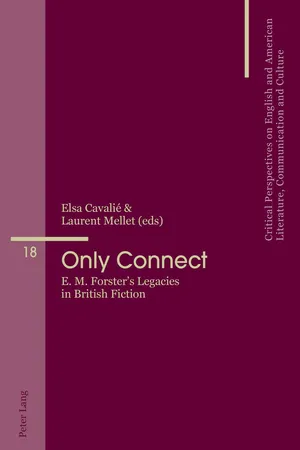
- 352 pages
- English
- PDF
- Available on iOS & Android
About this book
Since Forster's death in 1970, many British novelists and film directors have acknowledged and even claimed the influence of the novelist of the English soul (in Woolf's terms) and of a renewed faith in both human relationships and a quintessentially British liberal-humanism. After the ethical turn at the end of the twentieth century, British literature today seems to go back even more drastically to the figure of the individual human being, and to turn the narrative space into some laboratory of a new form of empowerment of the other's political autonomy. It is in this context that the references to Forster are more and more frequent, both in British fiction and in academia. This book does not only aim at spotting and theorising this return to Forster today. Rather we endeavour to trace its genealogy and shed light on the successive modes of the legacy, from Forster's first novel, Where Angels Fear to Tread (1905) onwards, to the novelisation of Forster himself by Damon Galgut. How can the principle of connection, of correspondences and echoes, which informed Forster's private life and approach to writing so much, equally characterise the aesthetic and political influence of his œuvre?
Frequently asked questions
- Essential is ideal for learners and professionals who enjoy exploring a wide range of subjects. Access the Essential Library with 800,000+ trusted titles and best-sellers across business, personal growth, and the humanities. Includes unlimited reading time and Standard Read Aloud voice.
- Complete: Perfect for advanced learners and researchers needing full, unrestricted access. Unlock 1.4M+ books across hundreds of subjects, including academic and specialized titles. The Complete Plan also includes advanced features like Premium Read Aloud and Research Assistant.
Please note we cannot support devices running on iOS 13 and Android 7 or earlier. Learn more about using the app.
Information
Table of contents
- Cover
- Contents
- Introduction: Forster and After (Elsa Cavalié and Laurent Mellet)
- Part I. New perspectives on Forster: personal legacies
- Part II: Ethical legacies: from Forster to contemporary British fiction
- Part III: Aesthetic legacies: ‘Only connect’?
- Part IV: Gay legacies: ‘Only disconnect’?
- Notes on Contributors